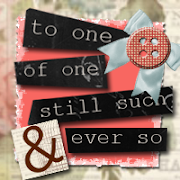This is true for most of his poems. However, some of his poems remind me that he's just a proper human being as the rest of us, a person with ordinary feelings, ordinary affections, ordinary capacity to love. I think the poem "To My Mother" is a perfect example of that.
Because I feel that, in the Heavens above,The first four lines is filial obligation. A child is expected to be "devotional" to their mothers, to treat them with love and respect. But Poe is not talking about his mother here. He's talking about his wife's mother. His deceased wife's mother.
The angels, whispering to one another,
Can find, among their burning terms of love,
None so devotional as that of “Mother,”
Therefore by that dear name I long have called you—
You who are more than mother unto me,
And fill my heart of hearts, where Death installed you
In setting my Virginia's spirit free.
My mother—my own mother, who died early,
Was but the mother of myself; but you
Are mother to the one I loved so dearly,
And thus are dearer than the mother I knew
By that infinity with which my wife
Was dearer to my soul than its soul-life.
He says that "death installed [the mother]/In setting [his wife's] spirit free." And that's the reason why that mother is "more than a mother" to him. Because he loved his wife so much, he extended that love to the people that his wife loved and the people that loved his wife.
He even has a reason to love his wife's mother more than his own mother because he his wife "was dearer to [his] soul than its soul-life." The fact that he loves her mother more than his mother is in parallel with the fact that he loves her more than he loves himself.
But it doesn't mean that the mother is just a representative of is wife, or replacement of his mother. He calls her My Mother. It's his own mother. His relationship with her is also personal, not just an in-law relationship.
The most touching part is that it's true. Poe was so close to his mother-in-law. He sent letters to her as much as one would to a mother. He might be the master of psychopathic stories but, a man is but a man.
















